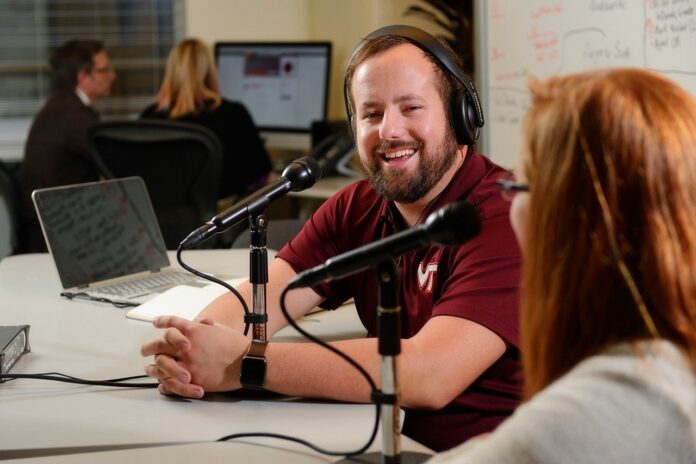The recently created Center for Oral History brings together scholars and community members to create and preserve oral stories and provide an introduction to the field of study of oral history.
For several years, a group of Virginia Tech faculty from disciplines across campus discussed the challenges in creating, managing, and accessing oral history collections. The group included representatives from existing oral history projects, such as VT Stories, which was founded with assistance from Laura Sands as well as David Trinkle from the Virginia Tech Carilion School of Medicine, who since 2018 has worked on documenting health care in the Roanoke Valley with the Healthstorian, a mobile oral history audio booth.
In 2019, the group agreed on the need for a formal organization focused on all aspects of oral history.
The group decided that a Center for Oral History would raise awareness for the use of oral history, formalize practices and training to create oral histories, and educate the public about the importance of oral history for both research and outreach purposes. The center is not a repository for oral history content, rather it was created to align existing resources and expertise on campus, support new oral history projects, identify existing oral history collections in archives, and educate the public by making more oral history content accessible for study or enjoyment.
“The Center for Oral History is a critical addition to Virginia Tech’s research, outreach, and educational missions,” said Katrina Powell, founding director of the Center for Refugee, Migrant, and Displacement Studies and member of the Center for Oral History’s stakeholders committee. “There are many faculty, students, and staff who are engaged or want to be engaged in oral history, and this center will provide a central place to conduct research, learn about oral history methodologies, and showcase university and community projects.”
As a college-level center, the Center for Oral History brings together practitioners, researchers, archivists, technical experts, Institutional Review Board representatives, and community advisors into a standalone group focused on the process and practice of oral history. The center is based in the University Libraries with partners in the College of Liberal Arts and Human Sciences and the Virginia Tech Carilion School of Medicine.
“Through training programs, equipment loans, individual or classroom consultations, and resource lists, we hope to make the practice and study or oral history a much more common part of the Virginia Tech experience,” said Aaron D. Purcell, chair of the Center for Oral History and director of University Libraries’ Special Collections and University Archives.
“We are truly an interdisciplinary group with years of experience in oral history,” said Ren Harman, member of the center’s stakeholders committee and University Libraries’ oral history projects archivist. “There are so many pieces that make up an oral history project, so it is nice to have every piece of the puzzle represented within this group.”
Jessica Taylor, assistant professor of oral and public history in the College of Liberal Arts and Human Sciences and member of the center’s stakeholders committee, is heavily involved in recording and preserving oral histories.
“For my part, we have all been recently reminded that we are living in historical moments, that life can change rapidly, and that our elders are precious,” said Taylor. “We are also reminded, again and again, that we frame and take part in historical moments through contemporary social and economic inequalities. I’m so happy to work with other people on and off campus who find documenting and preserving unwritten memories from people of all walks of life to be powerful and urgent.”
The Center for Oral History is reaching out to communities in the New River Valley and beyond to promote oral history collections and to train people who are interested in doing their own oral history interviews. Anyone interested in learning more about the center and its training opportunities, ongoing projects, existing oral history collections, using equipment, or best contacts for more information, should visit the center’s website.
– Ann Brown

